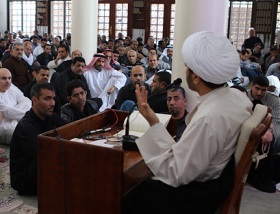(Ahlul Bayt News Agency) - Sheikh Ali Salman, the Secretary-General of Al Wefaq National Islamic Society, said in his Friday sermon that the anti-hatred declaration released by the opposition parties in Bahrain will be open for discussion throughout the coming month. He said it will be delivered to the official and civil parties so as to act as a frame to the understanding and meaning of hatred. We are hoping to get a positive response in order to all bond in releasing this project, he added, and if we get the blind-eye, the National Democratic Opposition Parties will launch it together with whoever desires to join.The anti-hatred declaration is based on the Camden Principles 2008, the 2012 Rabat Plan of Action and the Azhar 2011 document as references.Sheikh Ali said the opposition’s speech, starting from the Friday sermons, is more than fully committed to these three documents because it has always been a speech of reconciliation and inclusiveness.“This declaration comes to further clarify what is already clear. The opposition had and will always denounce hatred ”The Bassiouni report confirms in paragraphs 1279, 1280, 1281 and 1284 that the opposition’s rhetoric did not spread any hatred, but other sides did. Therefore, Mr. Bassiouni as well as the UN Human Rights Council recommended that the State-media be reformed, not the opposition’s media”, he explained.“Our declaration also outlines the difference between hatred speech and the freedom of expression, according to international standards. In other words, freedom of expression cannot be banned under the title of counter-hatred”, he stated.About the dialogue in Bahrain, Sheikh Ali mentioned a number of points.“International reports say the solution in Bahrain is either to continue in the suppressive attitude, or engage in real negotiations to reach an agreed-upon resolution. The negotiations should aim to find a political resolution for coexistence and solve the problem from the roots. The root of the problem in Bahrain are the very same of that in around 200 states in the world. The conflict around the world is about power. The problem in Bahrain is that power is practiced unilaterally, and the negotiation is to solve this problem. If power is practiced by force and without mandate from the people, then the problems will continue and stability will be hard to reach”.Sheikh Ali said the opposition parties were serious and honest from the beginning of the dialogue and had made their remarks in 9 points inviting the authority to agree but it was Intransigent towards us. He said agreement on essential issues could be reached within one month if good and honest intentions existed.In his sermon, he also thanked the activists who held the “Stop the Shipment” campaign and all the organizations that supported the campaign. He also thanked the states that responded and suspended any exports of arms to Bahrain. “Sates are acknowledging that Bahrain is misusing these arms to repress the people who are demanding freedom”.Sheikh Ali made an appeal to international rights organizations and the Red Cross to directly interfere and stop the inhumane violations practiced against prisoners in Bahrain. He said according to documentation reports by rights groups, and what he have heard from families of prisoners during his visits, the prisoners are being subjected to various violations, including:
- Torture and maltreatment during the first period of detention
- Prison cells which are designed to room 2 to 4 detainees are crowded with an average of 11 detainees.
- Prisoners are deprived from receiving winter clothes from their families
- Prisoners are being punished for no reason, the latest incident was the violations against minors.
- No drinking water provided in the prison’s canteen
- Family visits are delayed, especially in Juw prison
- Prisoners are denied medical care and treatment

